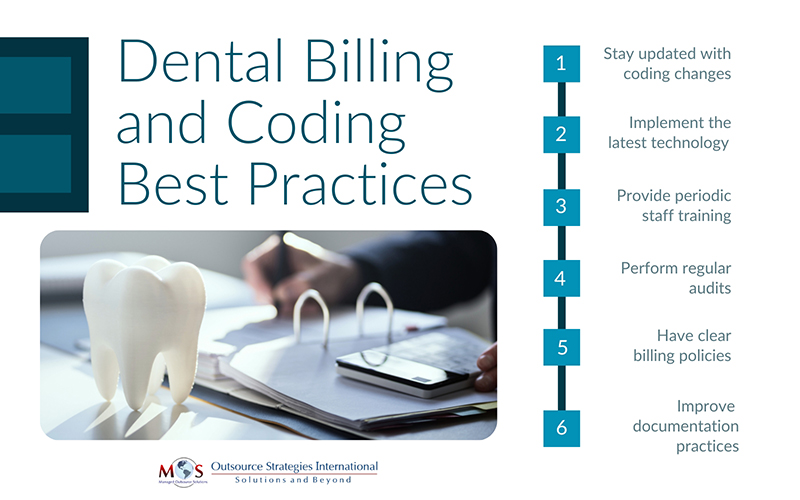Dentistry, despite being one of the most rewarding careers in the world, can be stressful at times, especially dental billing.
Dental billing is not something dentists are taught at school, but it is absolutely necessary to master the process to ensure their dental practice survives and flourishes. Efficiently managing dental insurance claims submission can help ensure a consistent cash flow and establish overall practice profitability.
The Present Financial Landscape of Dental Practices
The dental industry has gone through some financial turbulence over the past few years, especially post-pandemic. In 2022, the average net income for general dentists in private practice declined by 7%, primarily due to rising practice expenses. Contrastingly enough, the average net income for dentists in 2023 was $218,710 for general dentists, with specialists earning around $345,860, according to the Survey of Dental Practice.
Regardless, many practices are facing challenges in generating a positive cash flow due to increasing operational costs, denied dental insurance claims, and ever-evolving industry dynamics.
Dental Billing vs. Medical Billing – What’s the Difference?
It is common for people to use the terms dental billing and medical billing interchangeably, but they aren’t exactly the same. Even though they both share the same goal—minimizing claim errors and maximizing profits—they serve different purposes.
Both dental/medical billing involves retrieving patient information and submitting claims to maximize insurance reimbursement for rendered services. While dental insurance is preventive (proactive), medical insurance is remedial (reactive). That’s the reason why dental billing is used for teeth cleanings, imaging and fluoride treatment, and medical billing is used for oral surgery, broken teeth, and emergency services.
The Role of Billing and Coding in Revenue Optimization
Accurate billing and coding are indispensable aspects in ensuring dental services are promptly reimbursed. Any errors in these areas can lead to claim denials, delayed payments, and potential revenue loss. Optimizing billing and coding not only streamlines administrative tasks but also improves the financial performance of a practice.
Moreover, efficient patient billing in dentistry builds a positive relationship with patients and insurance companies by ensuring transparency and minimizing disputes. Precise billing and coding also provide valuable insights towards evaluating the practice’s performance and pinpoint areas required for improvement, ultimately leading to more efficient healthcare delivery.

What Are the Best Practices for Optimizing Dental Billing?
- Stay Current with Coding Changes
Dental coding, like medical coding, is dynamic with regular updates occurring to Current Dental Terminology (CDT) codes. It is important to stay current with these changes, which is crucial for accurate coding and billing. Optimizing CDT code usage can significantly enhance reimbursement rates and reduce claim denials, ultimately boosting overall revenue. Implementing dental coding best practices prevents claim denials, delayed payments, and potential fraud allegations.
- Utilize Modern Technology
Integrating advanced dental billing software can automate processes, minimize manual errors, and accelerate claim submissions. For instance, implementing AI-based systems has reduced claim denials by 22% for Community Medical Centres of Fresno.
- Periodic Staff Training
Investing in staff training is as important as investing in the latest technologies. Regular training ensures that the billing team is up-to-date with the latest coding practices and regulatory requirements, thereby reducing the likelihood of errors.
- Perform Regular Audits
Regardless of whether your practice has a foolproof billing/coding system in place, it is advised to conduct timely reviews of billing and coding practices that will help identify and rectify errors, which in turn ensures compliance and optimizes reimbursement.
- Implement Clear Billing Policies
Transparent communication with patients regarding billing procedures and insurance coverage fosters trust and reduces payment delays.
- Enhance Documentation Practices
Comprehensive and accurate documentation supports the necessity of procedures, facilitating smoother insurance claims and reducing denials.
- Dental insurance verification
Proper verification of patient eligibility ensures accurate coverage details are obtained before treatment, reducing claim denials and billing delays. It also helps dental offices provide clear cost estimates to patients, improving transparency and trust.
The Impact of Optimized Billing in Dental Practice
Implementing these strategies can lead to:
- Improved Cash Flow: Efficient billing processes ensure timely reimbursements, enhancing the practice’s cash flow.
- Minimized Claim Denials: Accurate coding and thorough documentation decrease the likelihood of claim rejections.
- Enhanced Compliance: Staying updated with coding changes and conducting regular audits ensure adherence to industry regulations.
- Improved Patient Satisfaction: Clear billing policies and efficient processes contribute to a positive patient experience.
Why Collaborate with Professional Dental Revenue Cycle Management Services?
Considering the intricacies involved in dental billing and coding, it is ideal to partner with a professional dental billing company to gain that competitive edge. These experts offer specialized services, including:
- All-in-One Billing Solutions: They can handle the entire billing process, starting from claim submission to follow-up.
- Expert Coding Services: They have an experienced team that can ensure accurate and up-to-date coding practices.
- Financial Analytics: Through advanced technology, they can provide deep insights into the practice’s financial performance and thereby identify areas for improvement.
- Regulatory Compliance: While implementing the most advanced practices and technology, they also keep abreast of industry changes to maintain compliance.
Outsource Strategies International (OSI), specializes in providing tailored dental and medical billing services. By partnering with OSI, you can:
- Maximize Revenue: Through precise billing and coding, ensuring you receive rightful reimbursements.
- Gain Financial Insights: Access detailed reports and analytics to make informed business decisions.
- Reduce Administrative Burden: Allowing you to focus more on patient care while OSI handles the complexities of billing.
- Ensure Compliance: Staying ahead of regulatory changes to keep your practice compliant.
Final Thoughts
In the ever-evolving dental industry, optimizing your billing processes is crucial for maintaining and growing your practice’s finances. Seeking the help of healthcare RCM professionals can significantly reduce the administrative burden, enhance claim accuracy, and boost the practice’s overall workflow. Partnering with a professional medical billing company like OSI ensures that you navigate RCM complexities efficiently, allowing you to concentrate on what you do best—providing exceptional dental care.
Safeguard Your Practice’s Financial Health with OSI!
To streamline your billing for Schmorl’s nodes and other spinal conditions.




